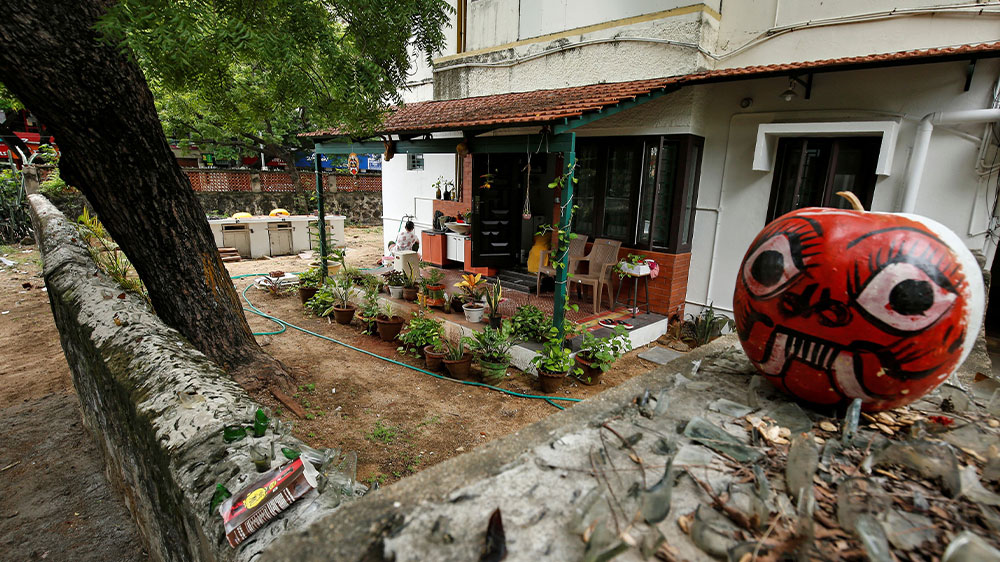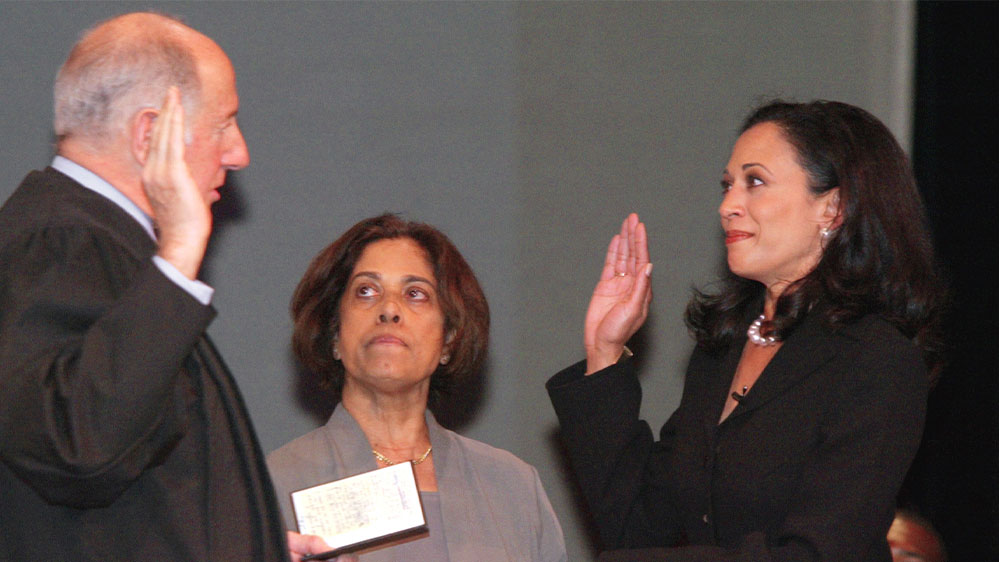Kamala Harris is influenced by her Indian and Jamaican heritage
‘Historic day for Indian community’, Harris’s uncle cheers from India as US Democrats make appeal to people of colour.

Kamala Harris is not just the first Black woman to be selected as a vice-presidential candidate in the United States.
A child of immigrants, Harris is the first woman of Indian and Jamaican descent to reach a position in US politics that has long been reserved for whites only.
Keep reading
list of 4 itemsTrump ally Rudy Giuliani files for bankruptcy following defamation case
‘Insurrection’ should bar Donald Trump from US presidency, lawyers argue
Ex-Proud Boys leader Joseph Biggs sentenced to 17 years for US Capitol riot
Presumptive Democratic presidential candidate Joe Biden is betting that, on balance, Harris will have broad appeal with Black women and other voters of colour and serve as an anchor for the Democratic Party – all while boosting turnout among white liberals and pulling support from independents and Republican-leaning white voters who have soured on President Donald Trump. Indeed, Harris’s human life story stands in sharp political contrast to the severe anti-immigrant policies of Trump and his administration.
“Our family feels happy and I feel happy that my sister, Shyamala, her mother, would have been very happy and proud of her daughter,” Harris’s maternal uncle Gopalan Balachandran told media outlets in India on Wednesday.
“It’s a historic day in number of ways for the Indian community for the first time getting into a high political position,” Balachandran said, according to the Reuters news agency.

Harris was born in Oakland, California in 1964 to a British Jamaican-born father, Donald Harris, and an Indian mother, Shyamala Gopalan Harris. She spent many of her formative years in nearby Berkeley.
On the campaign trail, Harris often speaks of the deep bond she shared with her mother, who she has called her single biggest influence.
“My mother understood very well she as raising two Black daughters,” Harris wrote in a 2018 autobiography.
“She knew that her adopted homeland would see Maya and me as Black girls, and she was determined to make sure we would grow into confident Black women,” she wrote. Their mother gave them Sanskrit names to carry their Indian identities.
Shyamala was born in 1938 in Chennai, formerly Madras in British India. She came to the US for graduate studies at the University of California, Berkeley, where she met her future husband, a doctoral student in economics in the early 1960s.

For two freethinking young people drawn to activism, they landed on campus from opposite sides of the world just as US protests exploded around civil rights, the Vietnam War and voting rights. Their paths crossed in those movements, and they fell in love, according to an Associated Press 2019 candidate profile of Harris.
At the heart of Harris’s parents’ activism was a small group of students who met every Sunday to discuss the books of Black authors and grassroots activity around the world, from the anti-apartheid Black Consciousness Movement in South Africa to liberation movements in Latin America to the Black separatist preaching of Malcolm X in the US.
Harris says her mother gave her an early grounding in the civil rights movement and instilled in her a duty not to complain but rather to act.
Her mother died of cancer in 2009 at the age of 70.
Today, the senator finds herself asking her mother, spiritually, for advice or remembering one of her oft-repeated lines. Her mother’s amethyst ring sparkles from her hand. She still uses pots and wooden spoons that belonged to her mother and says she thinks of her when she is home and able to cook.
“She [Kamala Harris] likes South Indian food because when I used to go to her [place], my sister used to cook and she used to eat all of that, so, she likes Indian food,” said Balachandran, Harris’s uncle.
“Yeah, she is Indian, she likes India but that doesn’t mean anything that India says is right for her, good for her. She is also Jamaican. She is Afro-American. So, she uses her own judgement … she likes India, she likes Indian music, but she likes jazz music also,” he said.

Almost immediately after the announcement of Harris’s candidacy, Trump attacked Harris by reverting to stereotypes, calling her “extraordinarily nasty”, “meanest”, and “most horrible” during a White House news conference on Tuesday.
Karen Finney, a prominent Black strategist in the Democratic Party, pointed to immediate fundraising success as evidence that Biden’s take on Harris is better than Trump’s.
The Biden campaign hauled in almost $11m in the first four hours after Harris was announced as Biden’s pick.
The Biden-Harris ticket “makes clear that Biden is serious about having people who like the diversity of our country and our future at the highest decision-making tables. That gives people hope,” Finney told the Associated Press.
Harris’s father and her mother were separated when she was five years old. She writes of seeing him on weekends and over summers after he became a professor at Stanford University.
In a piece he wrote for the Jamaica Global website, Harris says he never gave up his love for his daughters, and the senator trumpeted her father as a superhero in her children’s book.
But their relationship had been on and off over the years. In February, when Harris jokingly linked her use of marijuana to her Jamaican heritage, her father labelled the comment a “travesty” and a shameful “pursuit of identity politics”.
